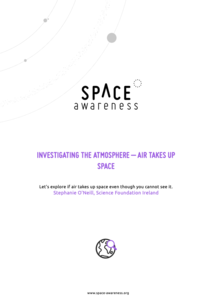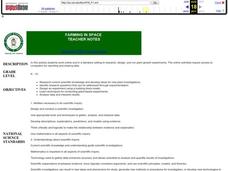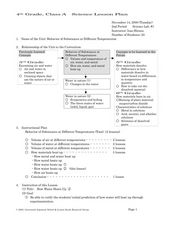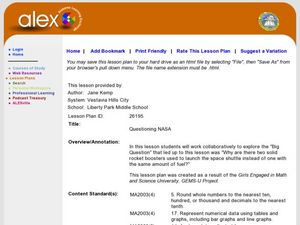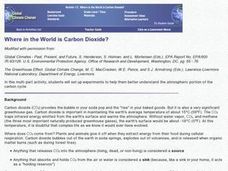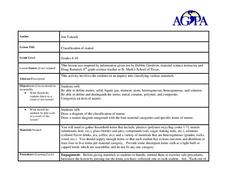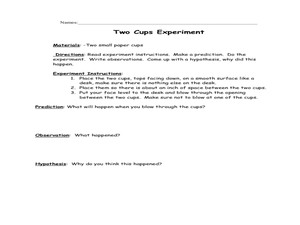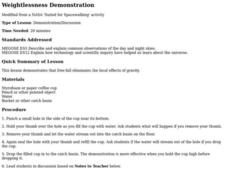Space Awareness
Investigating the Atmosphere - Air Takes Up Space
How do you know there is air? Can you see it, smell it, feel it? To begin the investigation, learners watch a video and discuss what they know about air and the atmosphere. Then, they participate in five different hands-on, inquiry-based...
National Science Teacher Association
Middle School Sampler: Science
Focus on inquiry-based learning in your science class with a series of activities designed for middle schoolers. A helpful packet samples four different texts, which include activities about predator-prey relationships, Earth's axis...
Space Awareness
History of the Universe
Your pupils may believe that you and their parents are the oldest things in the universe, but surprise! There are elements of the universe that are even older. Elementary scientists create a class timeline to demonstrate the...
PHET
Measuring the Interplanetary Magnetic Field
Scientists need to figure out how to measure interplanetary magnetic fields, but the magnetic field of the spacecraft is interfering with their readings. Scholars attempt to solve the problem that has perplexed NASA scientists for years.
Core Knowledge Foundation
A Time for All Seasons - Spring
Celebrate the arrival of spring with this fun primary grade science unit. Engaging young scientists with a variety of hands-on activities and inquiry-based investigations, these lessons are a great way to teach children about...
PHET
Earth’s Magnetic Field from Space
Feel the pull of science! The final installment of this 18-part series is an application of everything learned in the previous high school lessons. Scholars are given a magnetic field map and must propose an arrangement of magnets that...
Curated OER
Farming in Space
Students research, design, and run plant growth experiments online. They explore websites, design an experiment using an animation-based building block program, construct a soda bottle hydroponic production unit and a cardboard plant...
Curated OER
Space
First graders examine space in this unit of lessons. They create a KWL chart and write in their journals about space. They also examine the phases of the moon and identify the constellations.
NASA
Let's Investigate Mars
Take your science class on a hypothetical field trip to Mars with an engaging astronomy lesson. After first learning about NASA's Mars rover missions, young scientists plan their own scientific investigations of Earth's...
Howard Hughes Medical Institute
Gorongosa: Making Observations Activity
Do you have young scientists wanting to make new discoveries rather than just completing the same experiments? Young scientists use their observational skills to identify animals and patterns in animal behavior. Through tracking...
Curated OER
Fostering Geospatial Thinking: Space to Earth: Earth to Space (SEES)
Students locate and access data to help them with their science inquiry. In this geographical positioning lesson students evaluate and compare data sets.
Mascil Project
Circular Pave-Stones Backyard
Pack the lesson into your plans. Young mathematicians learn about packing and optimization with the context of circular paving stones. They use coins to model the paving stones, and then apply knowledge of circles and polygons to...
Curated OER
How Water Heats Up
Fourth graders conduct experiments heating water. In this inquiry-based early chemistry instructional activity, 4th graders use the materials given to experiment with the process of heating water. Students draw conclusions based upon...
Curated OER
Questioning NASA
Space science and math collide in this inquiry that investigates launching times for antacid-tablet rockets! Upper elementary or middle school learners collect data as they launch these mini rockets. They apply concepts of place value...
Curated OER
Where in the World is Carbon Dixoide?
Students conduct experiments designed to detect the presence of CO2 by using a BTB that changes color (blue to yellow) in the presence of CO2. First, students experiment with the CO2 from combining vinegar and baking soda. In part two,...
Curated OER
Scientific Inquiry
Middle schoolers make inferences about what activities occur at different places in school. They form a hypothesis as to how space is used. They simulate how archeaologists explore past people by designing and conducting a research project.
Curated OER
Animal Coverings
Students compare and contrast the types of coverings found on animals. They identify a wide variety of animals in a museum room. They classify animals based on their coverings as well.
Curated OER
Classification of Matter
Students investigate common household items and classify them into types of matter. In this matter lesson, students group given items into categories based on their characteristics. They also complete a concept map about matter and...
Curated OER
Galaxies Galore, Games and More
Students practice skills used in scientific investigation while studying the three main types of galaxies. Students identify Earth as part of Milky Way galaxy, the parts of galaxies, and the types of galaxies, as well as classify...
Curated OER
Geometry of Radio Meteor Reflections
Ninth graders investigate and describe ways that human understanding of Earth and space has depended on technological development. They describe and interpret the science of optical and radio telescopes, space probes and remote sensing...
Curated OER
Understanding Bernoulli's Principle
Fifth graders explain why we fly. For this space science lesson, 5th graders discuss Bernoulli's prinicple and its relation to flight.
Curated OER
What Really Matters When it Comes to Sound?
Students conduct experiments to learn about sound wave vibrations in objects and pitch. Students test how varying the volume of water in a vessel changes frequency and pitch.
Curated OER
An Introduction to the Night Sky and Movement Astronomy
Basically, this is an interactive exploration of educational astronomy software and an app. Young astronomers discover how the apparent motion of the sky relates to Earth's movements and the position of the observer. It is out of this...
Curated OER
Weightlessness Demonstration
Middle schoolers explore the concept that free-fall eliminates the local effects of gravity. They discuss what an Earth-orbiting spacecraft experience is like as well as the terminology of weightlessness. Their lab experiment commences.
